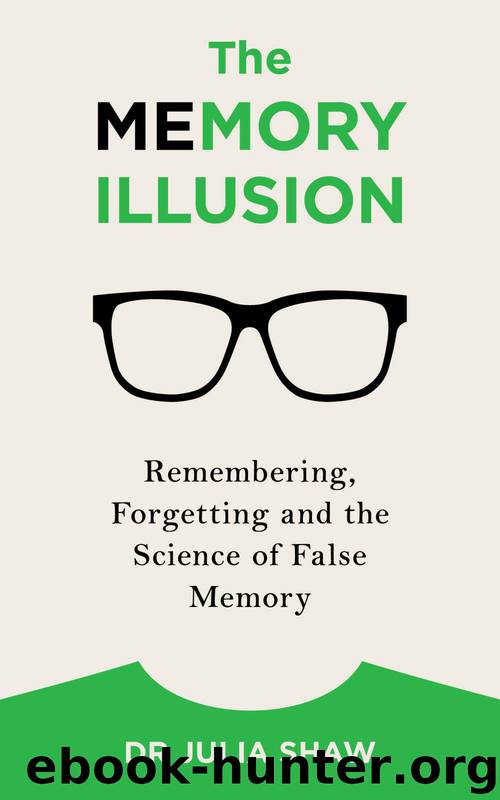The Memory Illusion: Remembering, Forgetting, and the Science of False Memory by Shaw Julia

Author:Shaw, Julia [Shaw, Julia]
Language: eng
Format: azw3, mobi, epub
ISBN: 9781473535176
Publisher: Random House
Published: 2016-06-15T16:00:00+00:00
Forgetting we forget
While overconfidence can be the result of memory processes, memory processes can also be the victim of overconfidence. In other words, memory causes overconfidence which causes overconfidence in memory.
I’ll try to make that a bit clearer. Prospective memory is our ability to remember to do things – we have already touched on it in previous chapters. It is the memory that is necessary in order for us to stick to goals and do things that are important for our future. It is like the personal assistant in our brains; our internal to-do list that reminds us that we have to go to the bank, go to the supermarket, clean the house, meet Sophie for lunch at 2pm, and so on.
It is an amazing ability. Yet, like all of our memory functions, it is far from perfect. How many times do we think to ourselves when we have an insight ‘I’ll remember that, I don’t need to write that down’, only to realise the next day that our brains are not as good at this task as our trusty Siri. Even when we have memory aids like phones or diaries at our instant disposal we overestimate our ability to remember information and may choose not to use them. This faulty appraisal process is why we forget meetings, forget to pick up packages at the post office, and on some days end up feeling like we’re not really capable of getting much done at all. We are overconfident that we will remember, and we pay the price.
And we pay the price in more than one way. Marketing teams know this feature of our memory and they try to exploit it; companies seem increasingly keen to capitalise on our overconfidence. Many of them offer a free trial for a subscription-based service, get us signed up, and then have an automatic billing process for subsequent months. What they are doing is banking on us forgetting to unsubscribe before their fees kick in. And it works. Repeatedly. We keep falling into the trap, presumably because we think this time we will remember to unsubscribe.
In an article published in 2010, businessmen Jeff Holman and Farhan Zaidi8 explore the economics of this prospective memory banking. They collected data on these kinds of free trials, and found that not only do many people stick with the services; they are far more likely to stick with them if the trial is longer. In their sample, retention was 28 per cent for those who were given a 3-day trial and a whopping 41 per cent for a 7-day trial group.
According Holman and Zaidi, ‘Firms are increasing the length of their free trials, possibly to increase naive forgetting by consumers … [they] offer extended free or reduced-price trials – of lengths running in months rather than days or weeks – ostensibly to give their new customers as much time as possible to test and experience the benefits of their products, but effectively as a way to more fully capitalize on consumer forgetting.
Download
The Memory Illusion: Remembering, Forgetting, and the Science of False Memory by Shaw Julia.mobi
The Memory Illusion: Remembering, Forgetting, and the Science of False Memory by Shaw Julia.epub
This site does not store any files on its server. We only index and link to content provided by other sites. Please contact the content providers to delete copyright contents if any and email us, we'll remove relevant links or contents immediately.
The Art of Thinking Clearly by Rolf Dobelli(10489)
Mindhunter: Inside the FBI's Elite Serial Crime Unit by John E. Douglas & Mark Olshaker(9344)
Change Your Questions, Change Your Life by Marilee Adams(7783)
Nudge - Improving Decisions about Health, Wealth, and Happiness by Thaler Sunstein(7709)
Mastermind: How to Think Like Sherlock Holmes by Maria Konnikova(7348)
The Power of Now: A Guide to Spiritual Enlightenment by Eckhart Tolle(5785)
Men In Love by Nancy Friday(5240)
Altered Sensations by David Pantalony(5106)
Factfulness: Ten Reasons We're Wrong About the World – and Why Things Are Better Than You Think by Hans Rosling(4744)
The Confidence Code by Katty Kay(4264)
Thinking in Bets by Annie Duke(4227)
Man and His Symbols by Carl Gustav Jung(4137)
The Worm at the Core by Sheldon Solomon(3487)
Why Buddhism is True by Robert Wright(3454)
Liar's Poker by Michael Lewis(3450)
Three Women by Lisa Taddeo(3434)
The Inner Life of Animals by Peter Wohlleben(3319)
Descartes' Error by Antonio Damasio(3279)
How Music Works by David Byrne(3272)
